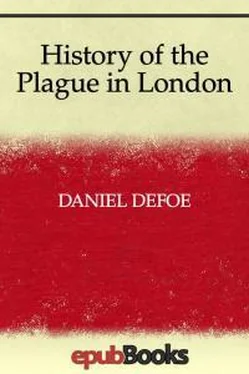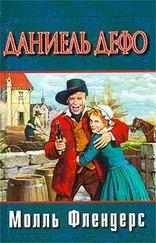Даниэль Дефо - History of the Plague in London
Здесь есть возможность читать онлайн «Даниэль Дефо - History of the Plague in London» весь текст электронной книги совершенно бесплатно (целиком полную версию без сокращений). В некоторых случаях можно слушать аудио, скачать через торрент в формате fb2 и присутствует краткое содержание. Год выпуска: 2014, Издательство: epubBooks Classics, Жанр: Историческая проза, на английском языке. Описание произведения, (предисловие) а так же отзывы посетителей доступны на портале библиотеки ЛибКат.
- Название:History of the Plague in London
- Автор:
- Издательство:epubBooks Classics
- Жанр:
- Год:2014
- ISBN:нет данных
- Рейтинг книги:4 / 5. Голосов: 1
-
Избранное:Добавить в избранное
- Отзывы:
-
Ваша оценка:
- 80
- 1
- 2
- 3
- 4
- 5
History of the Plague in London: краткое содержание, описание и аннотация
Предлагаем к чтению аннотацию, описание, краткое содержание или предисловие (зависит от того, что написал сам автор книги «History of the Plague in London»). Если вы не нашли необходимую информацию о книге — напишите в комментариях, мы постараемся отыскать её.
History of the Plague in London — читать онлайн бесплатно полную книгу (весь текст) целиком
Ниже представлен текст книги, разбитый по страницам. Система сохранения места последней прочитанной страницы, позволяет с удобством читать онлайн бесплатно книгу «History of the Plague in London», без необходимости каждый раз заново искать на чём Вы остановились. Поставьте закладку, и сможете в любой момент перейти на страницу, на которой закончили чтение.
Интервал:
Закладка:
Some, indeed, said things were worse; that the morals of the people declined from this very time; that the people, hardened by the danger they had been in, like seamen after a storm is over, were more wicked and more stupid, more bold and hardened in their vices and immoralities, than they were before; but I will not carry it so far, neither. It would take up a history of no small length to give a particular of all the gradations by which the course of things in this city came to be restored again, and to run in their own channel as they did before.
Some parts of England were now infected as violently as London had been. The cities of Norwich, Peterborough, Lincoln, Colchester, and other places, were now visited, and the magistrates of London began to set rules for our conduct as to corresponding with those cities. It is true, we could not pretend to forbid their people coming to London, because it was impossible to know them asunder; so, after many consultations, the lord mayor and court of aldermen were obliged to drop it. All they could do was to warn and caution the people not to entertain in their houses, or converse with, any people who they knew came from such infected places.
But they might as well have talked to the air; for the people of London thought themselves so plague–free now, that they were past all admonitions. They seemed to depend upon it that the air was restored, and that the air was like a man that had had the smallpox,—not capable of being infected again. This revived that notion that the infection was all in the air; that there was no such thing as contagion from the sick people to the sound; and so strongly did this whimsey prevail among people, that they run altogether promiscuously, sick and well. Not the Mohammedans, who, prepossessed with the principle of predestination, value [311] Think.
nothing of contagion, let it be in what it will, could be more obstinate than the people of London. They that were perfectly sound, and came out of the wholesome air, as we call it, into the city, made nothing of going into the same houses and chambers, nay, even into the same beds, with those that had the distemper upon them, and were not recovered.
Some, indeed, paid for their audacious boldness with the price of their lives. An infinite number fell sick, and the physicians had more work than ever, only with this difference, that more of their patients recovered, that is to say, they generally recovered; but certainly there were more people infected and fell sick now, when there did not die above a thousand or twelve hundred a week, than there was [312] Were.
when there died five or six thousand a week, so entirely negligent were the people at that time in the great and dangerous case of health and infection, and so ill were they able to take or except [313] Accept.
of the advice of those who cautioned them for their good.
The people being thus returned, as it were, in general, it was very strange to find, that, in their inquiring after their friends, some whole families were so entirely swept away that there was no remembrance of them left. Neither was anybody to be found to possess or show any title to that little they had left; for in such cases what was to be found was generally embezzled and purloined, some gone one way, some another.
It was said such abandoned effects came to the King as the universal heir; upon which we are told, and I suppose it was in part true, that the King granted all such as deodands [314] Personal chattels that had occasioned the death of a human being, and were therefore given to God ( Deo , "to God"; dandum , "a thing given"); i.e., forfeited to the King, and by him distributed in alms. This curious law of deodands was not abolished in England until 1846.
to the lord mayor and court of aldermen of London, to be applied to the use of the poor, of whom there were very many. For it is to be observed, that though the occasions of relief and the objects of distress were very many more in the time of the violence of the plague than now, after all was over, yet the distress of the poor was more now a great deal than it was then, because all the sluices of general charity were shut. People supposed the main occasion to be over, and so stopped their hands; whereas particular objects were still very moving, and the distress of those that were poor was very great indeed.
Though the health of the city was now very much restored, yet foreign trade did not begin to stir; neither would foreigners admit our ships into their ports for a great while. As for the Dutch, the misunderstandings between our court and them had broken out into a war the year before, so that our trade that way was wholly interrupted; but Spain and Portugal, Italy and Barbary, [315] The southern coast of the Mediterranean, from Egypt to the Atlantic.
as also Hamburg, and all the ports in the Baltic,—these were all shy of us a great while, and would not restore trade with us for many months.
The distemper sweeping away such multitudes, as I have observed, many if not all of the outparishes were obliged to make new burying grounds, besides that I have mentioned in Bunhill Fields, some of which were continued, and remain in use to this day; but others were left off, and, which I confess I mention with some reflection, [316] Censure.
being converted into other uses, or built upon afterwards, the dead bodies were disturbed, abused, dug up again, some even before the flesh of them was perished from the bones, and removed like dung or rubbish to other places. Some of those which came within the reach of my observations are as follows:—
First, A piece of ground beyond Goswell Street, near Mountmill, being some of the remains of the old lines or fortifications of the city, where abundance were buried promiscuously from the parishes of Aldersgate, Clerkenwell, and even out of the city. This ground, as I take it, was since [317] Afterward.
made a physic garden, [318] "Physic garden," i.e., a garden for growing medicinal herbs.
and, after [319] Since.
that, has been built upon.
Second, A piece of ground just over the Black Ditch, as it was then called, at the end of Holloway Lane, in Shoreditch Parish. It has been since made a yard for keeping hogs and for other ordinary uses, but is quite out of use as a burying ground.
Third, The upper end of Hand Alley, in Bishopsgate Street, which was then a green field, and was taken in particularly for Bishopsgate Parish, though many of the carts out of the city brought their dead thither also, particularly out of the parish of St. Allhallows–on–the–Wall. This place I cannot mention without much regret. It was, as I remember, about two or three years after the plague was ceased, that Sir Robert Clayton [320] Lord mayor of London, 1679–80, and for many years member of Parliament for the city.
came to be possessed of the ground. It was reported, how true I know not, that it fell to the King for want of heirs (all those who had any right to it being carried off by the pestilence), and that Sir Robert Clayton obtained a grant of it from King Charles II. But however he came by it, certain it is the ground was let out to build on, or built upon by his order. The first house built upon it was a large fair house, still standing, which faces the street or way now called Hand Alley, which, though called an alley, is as wide as a street. The houses in the same row with that house northward are built on the very same ground where the poor people were buried; and the bodies, on opening the ground for the foundations, were dug up, some of them remaining so plain to be seen, that the women's skulls were distinguished by their long hair, and of others the flesh was not quite perished; so that the people began to exclaim loudly against it, and some suggested that it might endanger a return of the contagion; after which the bones and bodies, as fast as they [321] The workmen.
came at them, were carried to another part of the same ground, and thrown altogether into a deep pit, dug on purpose, which now is to be known [322] Recognized.
in that it is not built on, but is a passage to another house at the upper end of Rose Alley, just against the door of a meetinghouse, which has been built there many years since; and the ground is palisadoed [323] Fenced.
off from the rest of the passage in a little square. There lie the bones and remains of near two thousand bodies, carried by the dead carts to their grave in that one year.
Интервал:
Закладка:
Похожие книги на «History of the Plague in London»
Представляем Вашему вниманию похожие книги на «History of the Plague in London» списком для выбора. Мы отобрали схожую по названию и смыслу литературу в надежде предоставить читателям больше вариантов отыскать новые, интересные, ещё непрочитанные произведения.
Обсуждение, отзывы о книге «History of the Plague in London» и просто собственные мнения читателей. Оставьте ваши комментарии, напишите, что Вы думаете о произведении, его смысле или главных героях. Укажите что конкретно понравилось, а что нет, и почему Вы так считаете.












